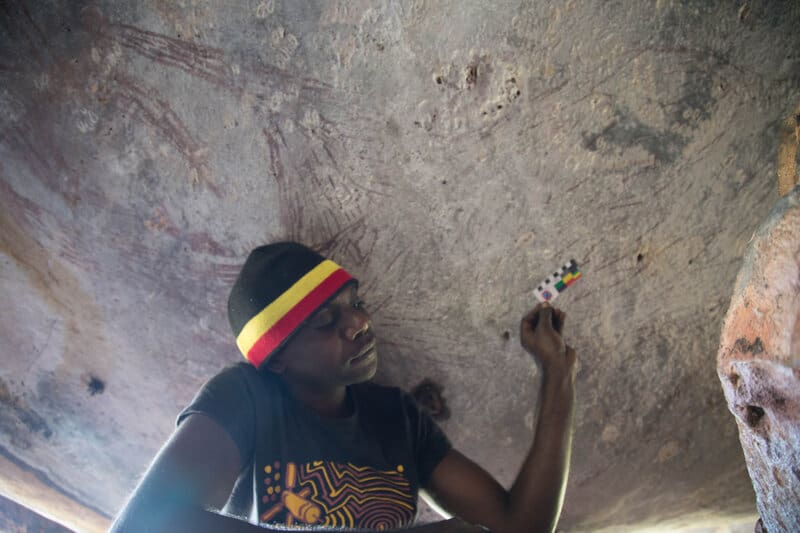A two-metre-long painting of a kangaroo in Western Australia’s Kimberley region has been identified as Australia’s oldest intact rock painting.
Using the radiocarbon dating of mud wasp nests, a University of Melbourne-led collaboration has put the painting at over 17,000 years old.
“This makes the painting Australia’s oldest known in-situ painting,” said post-doctoral researcher, Dr Damien Finch, who pioneered the exciting new radiocarbon technique.
Understand the world of these ancient artists
“This is a significant find as, through these initial estimates, we can understand something of the world these ancient artists lived in,” Dr Finch explained.
“We can never know what was in the mind of the artist when he or she painted this piece of work more than 600 generations ago, but we do know that the Naturalistic period extended back into the Last Ice Age, so the environment was cooler and dryer than today.”
The Kimberley-based research is part of Australia’s largest rock art dating project, led by Professor Andy Gleadow from the University of Melbourne.
It involves the Balanggarra Aboriginal Corporation, three other universities (Western Australia, Wollongong and Manchester), the Australian National Science and Technology Organisation, and partners Rock Art Australia and Dunkeld Pastoral.
Rock shelters have preserved the ancient galleries
The research was published yesterday (Tuesday) in the journal Nature Human Behaviour, with the researchers detailing how rock shelters have preserved the Kimberley galleries of rock paintings, many of them painted over by younger artists, for millennia.
Their paper also explains how they managed to date the kangaroo rock artwork as Australia’s oldest known in-situ painting.
The kangaroo is painted on the sloping ceiling of a rock shelter on the Unghango clan estate in Balanggarra country, above the Drysdale River in the north-eastern Kimberley region of Western Australia.
A typical example of paintings in this style
Earlier researchers looked at the stylistic features of the paintings and the order in which they were painted when they overlapped, and were able to work out from there that the oldest style of painting is what’s known as the Irregular Infill Animal or the Naturalistic period, which often features life-size animals. This kangaroo is a typical example of paintings in this style.
Dr Finch said it was rare to find mud wasp nests both overlying and underlying a single painting. For this painting, scientists were able to sample both types to establish the minimum and maximum age for the artwork.
“We radiocarbon-dated three wasp nests underlying the painting and three nests built over it to determine, confidently, that the painting is between 17,500 and 17,100 years old; most likely 17,300 years old,” he stated.








 Explore top-rated compensation lawyers in Brisbane! Offering expert legal help for your claim. Your victory is our priority!
Explore top-rated compensation lawyers in Brisbane! Offering expert legal help for your claim. Your victory is our priority! 

 "
"


